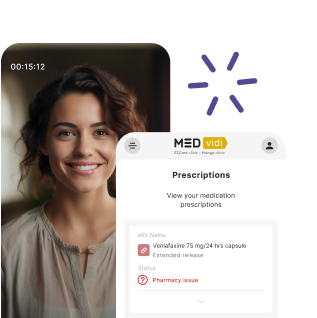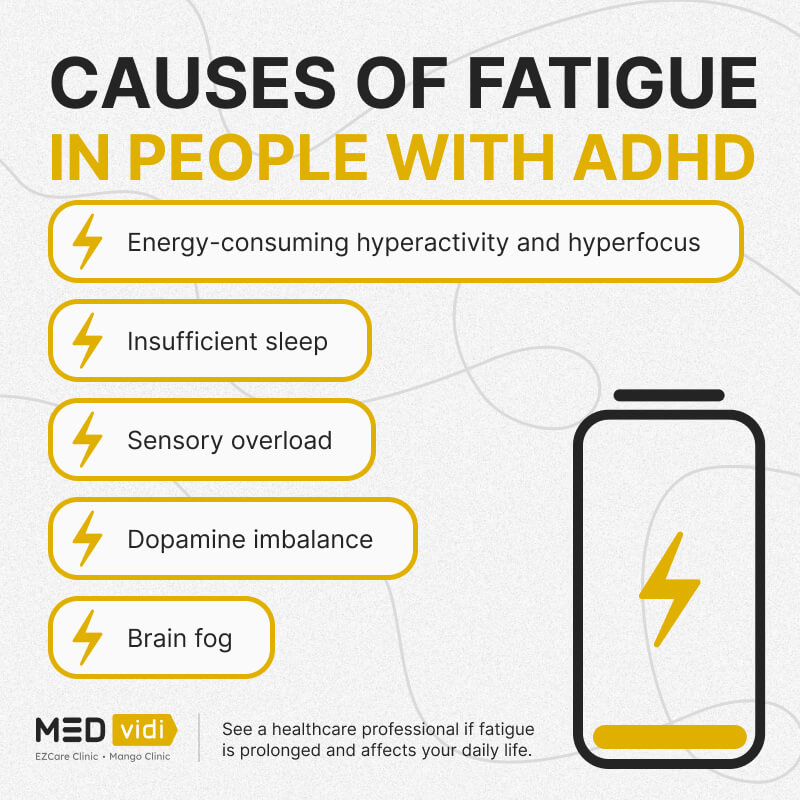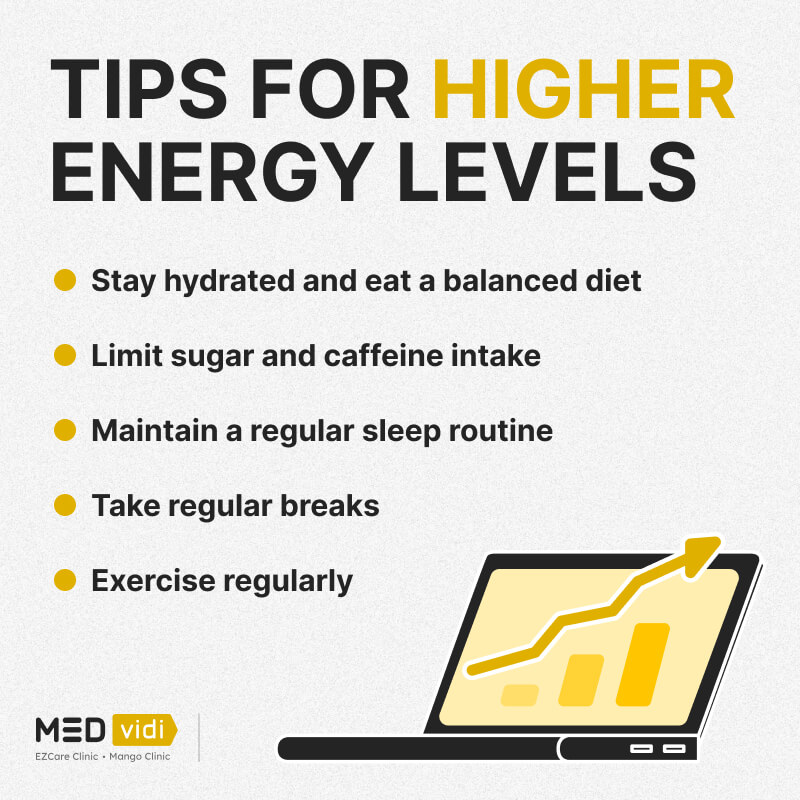Highlights
- Mental and physical fatigue is common among people with attention deficit hyperactivity disorder.
- Fatigue is characterized by sleepiness, impaired concentration, sore muscles, and slow reaction times.
- Improper medication dosage, stress, and sensory overload can cause ADHD fatigue.
- Strategies to manage ADHD fatigue include both lifestyle changes like regular exercise and medical interventions like psychotherapy or medication.
Attention deficit hyperactivity disorder (ADHD) is commonly associated with impulsivity, hyperactivity, and inattention. However, many are not aware that chronic fatigue can also be a significant part of the ADHD experience — one study found that
This article explores the intricacies of ADHD-related fatigue. We will delve into its various forms and the underlying causes that contribute to this overwhelming sense of tiredness.

Understanding ADHD Fatigue
What exactly is fatigue and why those with ADHD can be chronically tired? The persistent feeling of being tired and sleepy all the time is not just about physical exhaustion; it can also manifest as mental and emotional weariness. Let’s take a closer look.
What Is Fatigue?
Fatigue is a
Can ADHD Make You Tired All the Time?
ADHD often leads to a profound feeling of fatigue that encompasses not just physical but also mental and emotional tiredness. This can happen because coping with ADHD can be quite tiring, and people may experience chronic exhaustion. On such low-energy days, someone with ADHD might find themselves with no energy, feeling drained from the constant effort needed to focus, stay organized, and manage impulses.
In work environments, where sustained attention and organization are required, this
Such ongoing tiredness can make daily life and routine tasks seem daunting and overwhelming. This is particularly true for people with inattentive ADHD, who face a continuous struggle with staying attentive and organized, often getting easily distracted and lost in daydreams. Managing this persistent fatigue is crucial for individuals with ADHD, requiring strategies tailored to their unique challenges and needs.
Types of ADHD Fatigue
ADHD and fatigue can manifest in several ways, often intertwining with other symptoms of the disorder:
- Physical fatigue. This is the most recognizable form, where the individual feels physically drained and lacks energy.
- Cognitive fatigue. Characterized by brain fog, difficulty in concentrating, and forgetfulness.
- Emotional fatigue. People with ADHD might experience heightened emotional responses, leading to
emotional exhaustion[4] , which can present as poor emotional regulation (e.g. irritability) or emotional numbness. - Sensory fatigue. Overstimulation from the environment can lead to a feeling of being overwhelmed and tired.
Learn more: Sensory processing disorder in adults
What Can Cause ADHD Fatigue?
Below are some of the reasons why you may be feeling constantly tired if you have ADHD.
1. Improper Medication Dosage
Medications, particularly stimulants, are commonly prescribed for ADHD treatment. However, a wrong dosage — either too high or too low — can lead to overwhelming anxiety and increase the severity of side effects. It is essential to work closely with your healthcare provider to find the correct dosage that helps you manage ADHD symptoms without serious adverse reactions.

2. Sleep Issues
Individuals with ADHD often experience disrupted sleep cycles. This disruption can include difficulty falling asleep, restless sleep, or waking up frequently during the night. Sleep disorders, such as sleep apnea or restless leg syndrome, are also
3. Stress
Managing the daily symptoms of ADHD can be inherently stressful. The effort required to maintain focus, organization, and control impulsive behaviors can be mentally exhausting. Chronic stress not only depletes energy levels but can also lead to burnout and depression, further exacerbating feelings of fatigue.
4. Hyperactivity and Hyperfocus
Hyperactivity in ADHD can also be physically draining. The constant need to move and the difficulty in staying still consume a significant amount of energy. Conversely, hyperfocus can lead to mental exhaustion. During hyperfocus, individuals may become so engrossed in a task that they ignore physical needs like eating or sleeping, resulting in fatigue.
5. Boredom
For individuals with ADHD, engagement in tasks that lack novelty or stimulation can lead to a state of under-stimulation or boredom, which is mentally taxing. This mental drain can manifest as fatigue, as the brain struggles to remain active and alert in less stimulating environments.

6. Dopamine Issues
ADHD is often linked to irregularities in dopamine levels, a neurotransmitter involved in mood and energy regulation. Untreated ADHD may result in lower dopamine levels which can lead to feelings of fatigue and lack of motivation, making daily tasks and activities more tiring and less rewarding.
7. Feeling Overwhelmed
The challenges of managing ADHD symptoms, along with everyday life demands, can be overwhelming. This sense of being constantly overwhelmed can lead to emotional exhaustion, which is just as debilitating as physical fatigue.
8. Sensory Overload
Many individuals with ADHD have a heightened sensitivity to their environment. Overstimulation from noise, light, or crowded spaces can quickly lead to sensory overload, causing significant mental fatigue and the need for a period of recovery.
9. Burnout
Continuous effort to cope with ADHD symptoms without adequate support or coping mechanisms can lead to burnout. This state of emotional, mental, and physical exhaustion is caused by prolonged stress and can significantly impact energy levels and motivation.
10. Brain Fog
Brain fog or cognitive dysfunction in ADHD can manifest as confusion, forgetfulness, and a lack of mental clarity. This symptom can be both a cause and a consequence of fatigue. It can make simple cognitive tasks feel overwhelming and exhausting, further contributing to the cycle of fatigue.
11. Co-existing Conditions
When two conditions occur together, they are called co-existing or comorbid. Having two disorders at the same time can increase the risk of fatigue. Here are the most common conditions that can occur with ADHD and make it more likely for fatigue to occur.

Anxiety Disorders
Anxiety is a
Chronic Fatigue Syndrome
Chronic fatigue syndrome (CFS) is a complex disorder characterized by extreme fatigue that does not improve with rest. But what exactly is the link between ADHD and chronic fatigue?
People with CFS are
Depression
ADHD and depression often go hand-in-hand. Adults with ADHD are
Strategies to Address ADHD-related Tiredness
Managing and mitigating the fatigue associated with attention deficit hyperactivity disorder involves a multifaceted approach that addresses both lifestyle and medical aspects.
Lifestyle Changes: 9 Tips
Here are some lifestyle interventions that can help combat ADHD fatigue:
- Stay hydrated. Adequate hydration is crucial for overall health, so even mild dehydration can lead to lower energy levels, tiredness, and cognitive difficulties. Drinking plenty of water throughout the day helps maintain optimal brain function.
- Eat a balanced diet. A diet rich in nutrients supports brain health and can help manage ADHD symptoms. Foods high in protein, healthy fats, and complex carbohydrates, and rich in vitamins and minerals provide the energy and nutrients necessary for cognitive function.
- Do regular exercise. Frequent physical activity is a powerful tool for managing fatigue associated with ADHD in adults. Exercise releases endorphins, which improve mood and energy levels. Additionally, physical activity helps regulate sleep patterns, which can be particularly beneficial for people with ADHD who struggle with sleep issues.
- Maintain a regular sleep routine. Consistent sleep patterns are essential for people with ADHD. Going to bed and waking up at the same time every day helps regulate the body’s internal clock, leading to better sleep quality. Creating a relaxing sleep routine, such as reading or taking a warm bath, can signal to the body that it’s time to wind down.
- Meditate daily. Mindfulness meditation is beneficial for ADHD. It helps reduce stress, improve concentration, and enhance overall well-being. Regular practice of meditation can also improve sleep quality, thereby reducing fatigue.
- Learn stress management techniques. Stress exacerbates ADHD symptoms and fatigue. Techniques such as deep breathing exercises, yoga, or progressive muscle relaxation can be effective in managing stress.
- Take regular breaks. For individuals with ADHD, taking short, frequent breaks during tasks can help maintain energy levels and prevent burnout. This practice is crucial when engaging in activities that require high levels of concentration or are less stimulating.
- Limit sugar and caffeine intake. Consuming high amounts of sugar and caffeine, especially later in the day, can disrupt sleep patterns. Reducing intake can help stabilize energy levels throughout the day and promote better sleep at night.
- Limit blue light exposure before bed. Viewing screens of computers, tablets, or smartphones can interfere with your circadian rhythm by stimulating alertness, potentially leading to insomnia.

Professional Help
Consult with healthcare professionals to receive personalized advice and treatment options to treat ADHD fatigue. Some commonly suggested interventions include:
- Psychotherapy. Cognitive-behavioral therapy (CBT) and other forms of psychotherapy can be effective in managing ADHD symptoms and associated stress and anxiety, which in turn can help get over fatigue.
- ADHD medication. For some individuals, medication may be necessary to manage ADHD symptoms effectively. Stimulant and non-stimulant medications can help improve focus, reduce impulsivity, and regulate other symptoms that contribute to fatigue.
Incorporating these strategies into daily life can significantly impact ADHD management and reduce related fatigue. However, it is essential to remember that each individual’s experience with ADHD can have unique features, and what works for one person may not work for another. You can see a healthcare professional for online ADHD treatment to determine the most suitable plan for managing your symptoms and overcoming fatigue.
Bottom Line
An ongoing battle with fatigue can significantly impact various aspects of life for those with ADHD, including work performance, social interactions, and overall well-being. The experience of having no energy and feeling drained is not just an occasional inconvenience; it is a frequent reality that can affect motivation, productivity, and personal relationships.
The struggle with chronic exhaustion in ADHD, especially in the inattentive subtype, often goes unnoticed by others. People with inattentive ADHD may not exhibit the more visible hyperactive symptoms but are inwardly grappling with maintaining focus and processing information efficiently. This invisible effort can amplify feelings of fatigue, making tasks that seem simple to others disproportionately tiring for those with ADHD.
Individuals with ADHD and those around them should recognize the extent of this fatigue and its impact. Understanding that this tiredness is a part of the ADHD experience can lead to more effective coping mechanisms. These include the incorporation of structured routines, regular breaks, and strategies to manage inattention and disorganization. Support from family, friends, and mental health professionals can also play a significant role in managing these symptoms, helping those with ADHD navigate their lives with more energy and less fatigue.
Overall, the key to managing ADHD-related tiredness lies in a holistic approach that combines lifestyle changes, therapeutic interventions, and, when necessary, medication. Healthcare professionals at MEDvidi can develop a comprehensive treatment plan for you — book an appointment today to get help within 24 hours.
FAQ
Can ADHD cause extreme fatigue?
Yes, attention deficit hyperactivity disorder can cause significant fatigue. While surprising to many people because ADHD is sometimes associated with hyperactivity, fatigue is one of the most common features of ADHD.
Are adults with ADHD always tired?
Not all adults with attention deficit hyperactivity disorder are frequently tired, but fatigue is a common symptom. ADHD can affect sleep patterns, response to stress, and overall management of energy levels, potentially leading to tiredness. However, the experience of ADHD varies greatly among individuals, and not everyone with ADHD will experience significant fatigue.
What does ADHD fatigue feel like?
Fatigue associated with ADHD often feels like a persistent sense of mental and physical exhaustion that isn’t relieved by rest. It can include feelings of being overwhelmed, difficulty concentrating, brain fog, and a general lack of energy. As a result, it can make everyday tasks seem more challenging and exhausting.
Does ADHD make you tired in the afternoon?
Many people with ADHD experience daytime fatigue. There are several reasons for this. Our circadian rhythm, the natural process that regulates our sleep cycle, makes us more tired in the afternoon. Additionally, some ADHD medications can lead to an energy crash in the afternoon.
Do people with ADHD need to sleep a lot?
People with ADHD do not necessarily need to sleep more than others, but they more often require consistent, quality sleep. Many individuals with ADHD struggle with sleep issues like sleep deprivation, difficulty falling asleep, restless sleep, or waking up frequently, which can impact their overall ability to rest, recharge, and manage symptoms effectively.
Do ADHD brains get tired easily?
Yes, an ADHD brain can get tired more easily due to the constant mental effort required to manage symptoms like inattention, hyperactivity, and impulsivity, as well as challenges like maintaining focus and processing sensory information. This can lead to quicker mental fatigue compared to those without ADHD.
Does caffeine make you sleepy if you have ADHD?
Caffeine is a stimulant and typically increases alertness. It stimulates the production of dopamine, which is a neurotransmitter in the brain. This leads to temporary feelings of well-being and alertness. However, if you consume caffeine too close to bedtime, it can cause insomnia, which can lead to feelings of fatigue the next day.
Why do ADHD stimulants make me sleepy?
Although not common, fatigue is a side effect of many stimulants, such as Adderall. So, people taking these medications may be more likely to experience tiredness.
How can I boost my energy with ADHD?
To boost energy, it’s essential for people with ADHD to maintain a balanced diet, ensure regular and quality sleep, engage in consistent physical exercise, and stay hydrated. It’s also important to find stress-management techniques that are effective for you and take regular breaks during tasks to avoid mental exhaustion. Following a structured daily routine can help in managing energy levels more effectively. Additionally, remember to consult a healthcare professional if you have prolonged fatigue.













